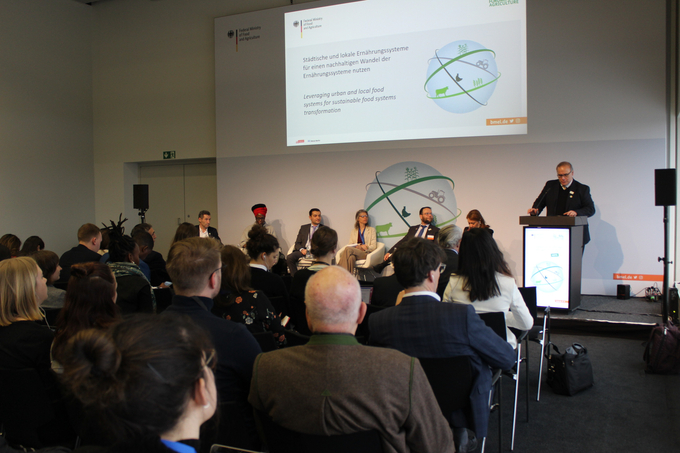June 21, 2025 | 02:12 GMT +7
June 21, 2025 | 02:12 GMT +7
Hotline: 0913.378.918
June 21, 2025 | 02:12 GMT +7
Hotline: 0913.378.918

FAO Chief Economist Maximo Torero speaking at the Global Forum for Food and Agriculture in Berlin, Germany.
Urbanization, along with climate change and technological progress, is contributing to a sea change in the way we produce and consume our food, meaning cities and local governments need greater support in helping build a sustainable agrifood systems transformation. This was the message from the Food and Agriculture Organization of the United Nations (FAO) to a panel discussion at today’s global conference in Berlin.
The 2023 edition of the Global Forum for Food and Agriculture (GFFA), an annual event hosted by Germany's Federal Ministry of Food and Agriculture, focuses on the transformation of our agrifood systems as a means of responding to the multiple crises facing global food security. These include climate change, the COVID-19 pandemic and the war in Ukraine.
One such venue was an expert panel discussion hosted by FAO and entitled "Leveraging urban and local food systems for sustainable food systems transformation."
The discussion was introduced by FAO Chief Economist Maximo Torero and was moderated by Raimund Jehle, FAO’s Regional Programme Leader. It saw the participation of, among others, Gabriel Ferrero de Loma-Osorio, Chairperson of the UN Committee on World Food Security, Souad Abderrahim, Mayor of Tunis, and Jane Battersby, Senior Lecturer at the University of Cape Town.
With 70 percent of global food currently being consumed in urban areas, and the world’s urban population expected to nearly double by 2050, the expert panel was invited to identify innovative ways of strengthening the role and function of urban, local and territorial food systems by looking at recent trends and new sources of data. The panel also discussed how city and local stakeholders can play a bigger role in achieving sustainable food systems transformation.
“FAO has been working on urban food systems that are also incorporated in the FAO Strategic Framework for 2022–31 as well, ensuring that we are not only considering rural food production, but also urban food systems,” Torero said in his introduction to the panel discussion.
Despite growing urbanization (at an annual rate of 3 percent, the urban population in low- and middle-income countries is growing three times faster than the rural population; while in middle-income countries, the share of the urban population is projected to increase from 42 percent in 2000 to 59 percent in 2030), cities and local governments do not receive the adequate recognition and support at national and global level. Africa and Asia are experiencing urbanization at the fastest rate, Torero said.
The Chief Economist also announced that the 2023 edition of FAO’s flagship The State of Food and Nutrition in the World report will focus on urbanization as a crucial topic to achieve the Sustainable Development Goals (SDG), specifically SDG2 Zero Hunger.
During the panel discussion, Souad Abderrahim advocated for more cooperation and mentioned as way of example a joint project with FAO on reducing food loss and waste through early education. Another practical example was provided by Armen Harutyunyan, representing the Eurasian Economic Commission, which has a platform designed to inform countries and private sector actors on innovative initiatives and solutions for improved food security in urban communities.
FAO's initiatives
FAO is already active on multiple fronts in this area.
Its Green Cities Initiative, for instance, focuses on improving the urban environment, strengthening urban-rural linkages and the resilience of urban systems, services and populations to external shocks. Launched in September 2020, the initiative aims to improve the livelihoods and well-being of urban and peri-urban populations in 1000 cities by 2030.
The Urban Food Agenda is an FAO flagship initiative to enhance sustainable development, food security and nutrition in urban and peri-urban areas, and nearby rural spaces. It consists of a vast range of policies, programmes and initiatives developed and implemented in partnership with different stakeholders: civil society, academia, UN & International agencies, City Networks and relevant public and private bodies and entities.
Finally, FAO is committed to ensuring the outcomes and success of the 2021 UN Food Systems Summit, which saw the creation of a Coalition on Sustainable and Inclusive Urban Food Systems designed to support the transformation of urban food systems.
(FAO.org)

(VAN) Poultry production in Poland, which has only started recovering from devastating bird flu outbreaks earlier this year, has been hit by a series of outbreaks of Newcastle disease, with the veterinary situation deteriorating rapidly.

(VAN) Extensive licensing requirements raise concerns about intellectual property theft.

(VAN) As of Friday, a salmonella outbreak linked to a California egg producer had sickened at least 79 people. Of the infected people, 21 hospitalizations were reported, U.S. health officials said.

(VAN) With the war ongoing, many Ukrainian farmers and rural farming families face limited access to their land due to mines and lack the financial resources to purchase needed agricultural inputs.

(VAN) Vikas Rambal has quietly built a $5 billion business empire in manufacturing, property and solar, and catapulted onto the Rich List.

(VAN) Available cropland now at less than five percent, according to latest geospatial assessment from FAO and UNOSAT.

(VAN) Alt Carbon has raised $12 million in a seed round as it plans to scale its carbon dioxide removal work in the South Asian nation.